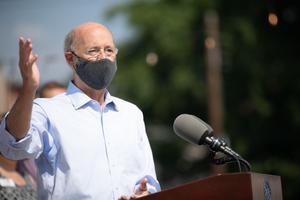Spotlight PA is an independent, non-partisan newsroom powered by The Philadelphia Inquirer in partnership with PennLive/The Patriot-News and other news organizations across Pennsylvania. Sign up for our free weekly newsletter.
HARRISBURG — A Central Pennsylvania county is suing Gov. Tom Wolf for nearly $13 million in coronavirus relief funding, claiming the governor overstepped his authority by withholding the money after local commissioners defied his state shutdown.
The lawsuit represents yet another test of Wolf’s emergency powers, which have been unsuccessfully challenged several times since the governor issued a disaster declaration this spring.
In May, Lebanon County’s commissioners voted 2-1 to buck the Wolf administration and lift state-mandated restrictions without permission. The governor had warned such a decision could jeopardize a county’s share of federal discretionary dollars for relief efforts.
“These folks are choosing to desert in the face of the enemy in the middle of a war that we Pennsylvanians are winning — and that we must win,” Wolf said at the time.
The General Assembly later approved legislation, signed by Wolf, that divided $625 million among 60 Pennsylvania counties for coronavirus response. The state’s seven largest counties, including Allegheny and Philadelphia, received a total of $1 billion in aid directly from the federal government.
In a suit filed Wednesday in Commonwealth Court, Solicitor David Warner Jr. said Wolf’s “refusal” to release the $12.8 million appropriated to Lebanon County “effectively consolidates complete legislative power in the executive branch during a declared state of emergency” and “creates a de-facto king” in the governor.
In recent weeks, Wolf has repeatedly justified the decision, saying he provided ample warning to counties.
“Don’t come say you want something from the state when you haven’t followed the rules,” he said last week. “That was the commissioners that the majority of people elected in Lebanon County. They represent them. I think maybe I’d think twice about reelecting them.”
Lebanon County is the only county that has not received its share of federal dollars from the state. It was also the last to officially enter the least restrictive “green” phase of Wolf’s reopening plan.
Republican leaders in the General Assembly, furious over the governor’s decision, said Wolf has no authority to withhold the funding. Wolf’s administration has pointed to guidelines later issued by the Department of Community and Economic Development which say counties “must have been, and remain, in compliance with all relevant laws, orders, and regulations during the period of the COVID-19 disaster emergency under the Governor’s proclamation.”
Lyndsay Kensinger, a spokesperson for Wolf, declined to comment on the litigation.
But in a statement last week, she said Wolf is empowered by the state’s Emergency Management Services Code to “amend and rescind executive orders, proclamations, and regulations which shall have the force and effect of law.”
“The governor did not make a decision to withhold the funding,” Kensinger said by email. “Lebanon County’s decision to violate the law deemed the county ineligible for CARES funding.”
This is far from the first time Wolf has been sued over his emergency powers, which were greatly expanded under the disaster declaration he signed in March.
That month, a group of business owners and a state House candidate sued Wolf over his shutdown of all nonessential businesses, claiming it was unconstitutional. The U.S. Supreme Court declined to take up the case after it was rejected by Pennsylvania’s highest court.
The Wolf administration has also been sued twice by state Senate Republicans. In one instance, the GOP-led legislature took Wolf to court after it passed a resolution leadership said would force Wolf to terminate the state’s disaster declaration. Wolf claimed he had the power to reject the resolution, and the state Supreme Court ruled in his favor.
Still ongoing is a lawsuit for documents related to a Wolf administration program that allowed some businesses to reopen during the shutdown, while others had to remain closed.
Lawmakers are also not done trying to wrest power away from the executive. This month, the General Assembly cleared the first hurdle to get a constitutional amendment on a future ballot that would allow state lawmakers to unilaterally end a disaster declaration.
100% ESSENTIAL: Spotlight PA relies on funding from foundations and readers like you who are committed to accountability journalism that gets results. If you value this reporting, please give a gift today at spotlightpa.org/donate.
